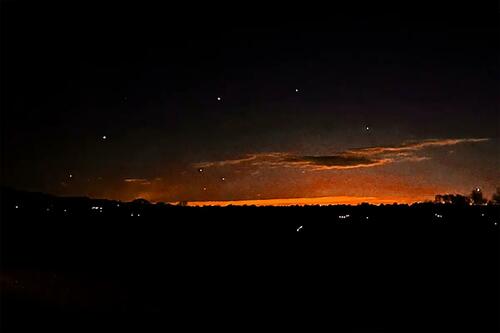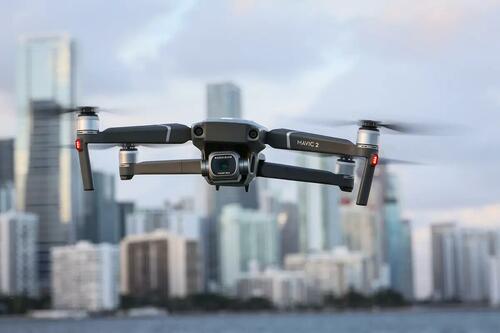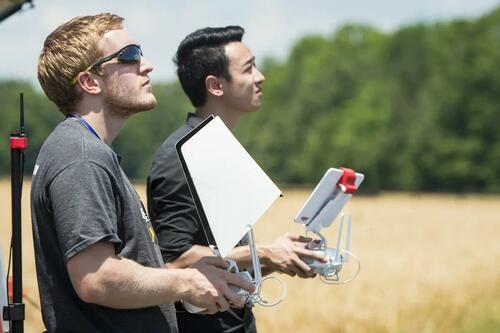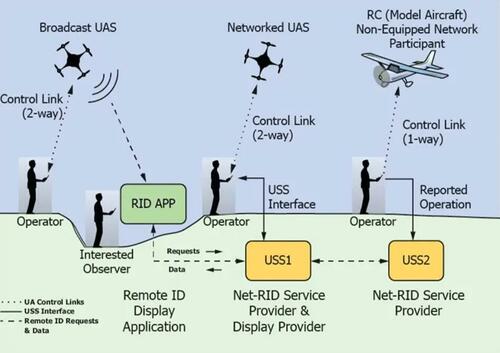Increased Drone Sightings Highlight New Risks, Aviation Experts Say
Authored by Jacob Burg via The Epoch Times (emphasis ours),
Ground observers across an increasing number of U.S. states are reporting aircraft in the sky that appear to be unmanned aerial systems (UAS), or drones, leaving the public on edge.
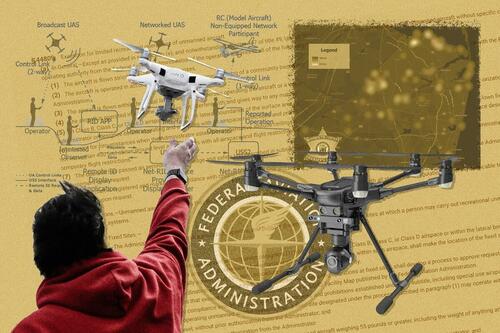
With no definitive answers available, aviation experts—perplexed by the federal government’s limited response—suggest multiple origins for the unidentified aircraft.
During weeks of sightings pooling out of states such as New Jersey, Pennsylvania, New York, Maryland, Virginia, Massachusetts, California, Ohio, and Utah, some observers reported seeing aircraft as large as SUVs.
Now, state and local officials are demanding answers from Washington.
A Dec. 17 joint statement released by the Department of Homeland Security, the FBI, the Federal Aviation Administration (FAA), and the Department of Defense confirmed more than 5,000 reported drone sightings in the past few weeks, “with approximately 100 leads generated.”
These reports consist of a “combination of lawful commercial drones, hobbyist drones, and law enforcement drones, as well as manned fixed-wing aircraft, helicopters, and stars mistakenly reported as drones” with nothing yet identified as anomalous, the government wrote, denying any national security or public safety risk.
The Epoch Times reached out to commercial pilots, aviation safety experts, and a leading counter-UAS company, who said that not only do these purported drones present a serious public safety and national security risk, but also, they may be privately owned, U.S. military assets, or weapons of foreign adversaries.
Shawn Pruchnicki, an aviation safety expert and assistant professor at Ohio State University’s Center for Aviation Studies, told The Epoch Times that until one of the aerial objects is brought down and further analyzed, no one can be sure whether all sightings are of actual drones or UAS and not other unidentified anomalous phenomena (UAP).
“I think one of the problems is that individuals, the government … the way the media is talking, is they’re already being labeled as drones. The term drones is a specific description of a certain type of vehicle, and that already is an explanation,” Pruchnicki said.
“Technically, they’re UAPs. We don’t know what they are.”
Even before reports of purported drones began coming out of New Jersey in November, ground observers had reported large numbers of unidentified aircraft that appeared to be drones over the past several years.
One drone swarm bearing a striking similarity to the current one was reported in 2020 over Colorado and Nebraska, including near a storage site for some of the United States’ Minuteman III nuclear missiles.
Although the FBI and FAA never identified who was operating those aircraft, the federal government suggested that the reports could be attributed to hobby drones and misidentified planets and stars.
There was also reportedly an unidentified drone incursion in the restricted airspace around Langley Air Force Base in Virginia throughout several nights in 2023.
The aircraft flew in formation and included fixed-wing drones and quadcopters.
In January, Shi Fengyun, a Chinese student at the University of Minnesota, was arrested in California before boarding a one-way flight to China. In July, Shi pleaded guilty to flying a drone to photograph U.S. military vessels over a classified naval installation in Norfolk, Virginia.
In December, federal authorities arrested Chinese citizen Yinpiao Zhou, 39, of Brentwood, California, as he was preparing to board a flight to China. Zhou allegedly flew a drone over and took photos of Vandenberg Space Force Base in California.
The alleged incident took place on Nov. 30, and federal agents found several aerial photographs of the base after searching Zhou’s drone.
Mary-Lou Smulders, chief marketing officer at Dedrone, one of the largest airspace security and counter-UAS firms in the world, contracting with 32 different countries, told The Epoch Times that her company has tracked more than 1 million drone violations over U.S. airspace in the past year alone.
That amounts to roughly 1,000 daily.
“I think the real overarching hidden message here is it’s happening every single day, and not just three or four a day, but over 1,000 a day,” Smulders said.
“And to date, despite bipartisan efforts, the government hasn’t done what they really need to do.”
Drones Flouting FAA Regulations
More than 700,000 of the year-to-date drone violations tracked by Dedrone involved drones flying at elevations higher than 400 feet, which is a violation of FAA regulations.
The FAA states that drones may not fly higher than 400 feet above ground unless they are flown within a 400-foot radius of a structure, and then cannot fly higher than 400 feet beyond that “structure’s immediate uppermost limit.”
Drones must also be “flown within the visual line of sight of the person operating the aircraft” and must weigh less than 55 pounds unless the operator has special approval from the FAA for specific use situations.
“Many of these drone sightings … appear to be these larger drones operating autonomously. So they are not working within line of sight. They are instead following a pre-programmed GPS flight plan,” Juan Browne, a commercial pilot for one of the major U.S. airlines, told The Epoch Times.
“That’s not legal. … unless somebody knows about it and has approved it.”
Browne explained that larger drones are usually “too big and too expensive” to be hobbyist drones and are rated as commercial aircraft, which are sometimes used in the agricultural industry or for carrying Hollywood-style cameras.
Drone operators must also comply with all airspace and flight restrictions, including “special use airspace designation and temporary flight restrictions,” government regulations state.
The purported drones flying near and around airports in the northeast are flouting FAA regulations.
The FAA has also recently introduced a new tracking system for drones called remote identification, which is the “ability of a drone in flight to provide identification and location information that can be received by other parties through a broadcast signal” through Wi-Fi or Bluetooth.
Generally, any drones that are required to be registered, “including those flown for recreation, business, or public safety,” must use remote ID unless explicitly flown within line of sight of the operator in a special FAA-Recognized Identification Area (FRIA).
FRIAs are defined geographical areas where drones without remote ID can be flown legally.
One pilot for a commercial airline who asked to remain anonymous told The Epoch Times that if Air Traffic Control (ATC) can’t track or locate these drone operators, they’re likely defying the FAA’s remote ID rules.
“[Remote ID] is a way of telling air traffic control and other aircraft that you’re out there. ‘I’m at this altitude for collision avoidance purposes.’ Clearly, that’s not being complied with because ATC doesn’t know anything about it,” he said.
“So if you have large drones in airspace that they shouldn’t be in, and ATC doesn’t know about it, it’s an illegal operation.”
However, remote ID does not always work so easily, according to Browne.
Read the rest here…
Tyler Durden
Tue, 12/31/2024 – 11:00
via ZeroHedge News https://ift.tt/DfboVsO Tyler Durden
